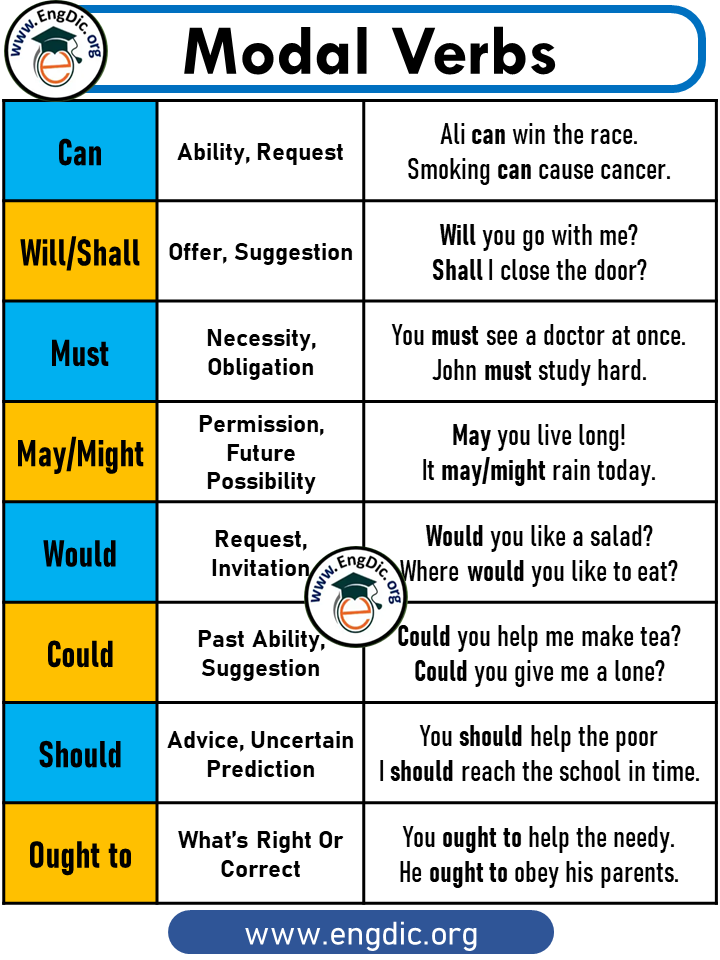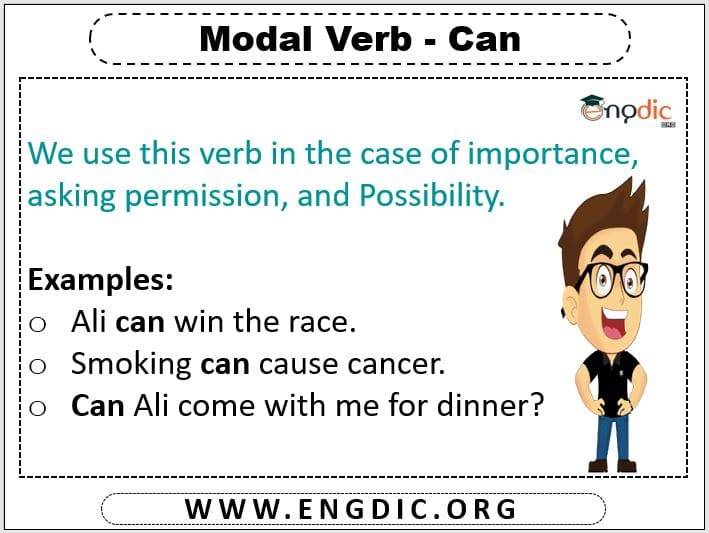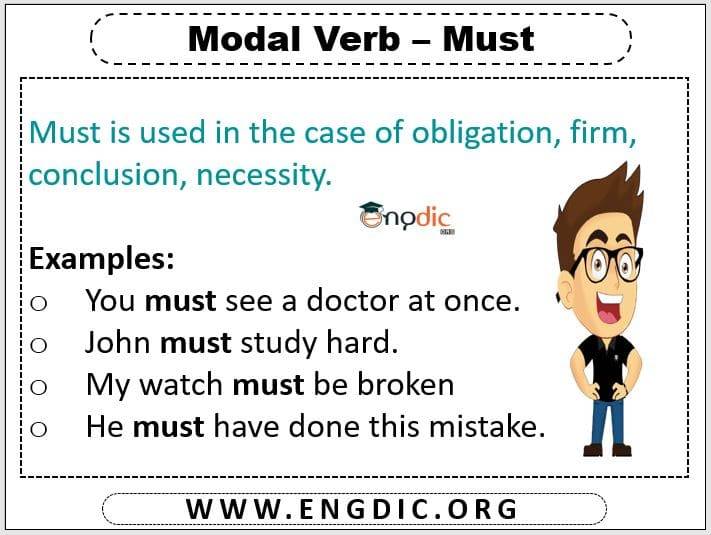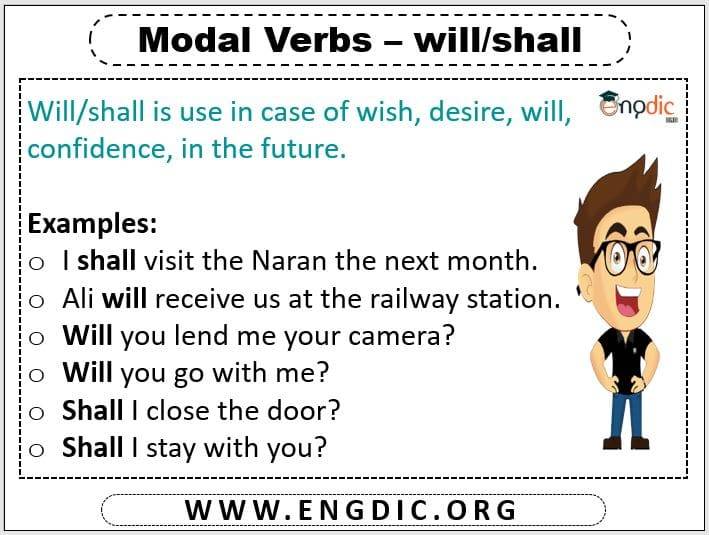Modal verbs are an essential component of the English language, and they play a significant role in shaping the meaning of a sentence. They are auxiliary verbs that are used to express a variety of attitudes, including possibility, permission, obligation, and ability.
In this blog post, we will explore 10 examples of modal verbs and provide their definitions and example sentences.
Whether you’re a native English speaker or an English learner, this post will help you understand how to use modals correctly in your writing and speaking. Additionally, we have included a PDF file that you can download and use as a reference for your future studies. So, let’s dive in and explore the fascinating world of modal verbs!
What are Modal Verbs?
Definition
Modal verbs are a kind of helping verbs. They show the mood of a verb such as ability, possibility, obligation, permission, advice, or some other mood.
Modal verbs are words that modify the verb. For example, he can go to school or she must leave now. They are isolated words that don’t take pronouns like I and you. Modal verbs always come before main verbs (can’t wait for dinner). The most common modals in English are can, could, may, might, must, ought to, shall, should, will, and would.
Some Common Modal Verbs are:
- Can
- Could
- May
- Might
- Shall
- Should
- Will
- Would
- Must

The Formula of Modal Verbs
Subject + Modal Verb + Main verb
Examples:
- I can win the race.
- You should have a walk daily.
Modal Verbs – Video
Different Modal Verbs with Examples
Can
CAN is a modal verb. It is used with another verb to show an ability or possibility. You use can in questions and negatives, but it is not usually necessary when making requests.
Examples:
- Ali can win the race.
- Smoking can cause cancer.
- Can Ali come with me for dinner?
- Can I play football?
- Can I come with you?
- Can I give you some advice?
- Can we meet up later this week for lunch?
Will/Shall
The modal verb “will” is used to make the future seem certain (he will arrive later). It can also be used as a way of making promises (I’ll take care of it) or offering guarantees (it will work this time). The other uses include expressing willingness (I’ll do it) or making an offer (will you go with me?). It can also be used to give permission (you will not go outside).
The word “will” is used in many other ways. It can be used to describe the habitual actions of someone (John will get up early every morning). Will can also indicate determination or promise. The meaning depends on the context of the sentence it’s being used in.
Examples:
- I shall visit the China the next month.
- Ali will receive us at the railway station.
- Will you lend me your camera?
- Will you go with me?
- Shall I close the door?
- Shall I stay with you?
- I will talk to the man.
- He shall be punished.
- I will talk to the man.
- He shall be punished.
- I will talk to the man tomorrow.
- He shall be punished tomorrow.
- He says he will talk to the man tomorrow.
- He says he shall be punished tomorrow.
Must
“Must” has many different meanings. For example, it’s often used to give orders or instructions: You must go to school every day. It can also express a strong obligation or requirement: There must be a limit to human patience. In addition, it can be used as a warning of impending doom or disaster: The plane suddenly went into a nosedive and everything that wasn’t bolted down started flying around the cabin. We were sure we must have been going down, but it turned out we had just entered a cloud bank.
Examples:
- You must see a doctor at once.
- John must study hard.
- My watch must be broken
- He must have done this mistake.
- He who wants to succeed must get up at five o’clock in the morning.
- While the tree is still young, it must be bent.
- If you want knowledge, you must put in the effort to obtain it.
- You must set your sails as soon as the wind blows.
Might/May
May and might are both ways of talking about possible situations. Might is used for expressing something that could have happened but didn’t (it might rain tomorrow). May is used to asking permission (“may I go now?”), to offer or invite someone (“may I take your order?”) or to talk about possibilities, especially in the present tense (“They may arrive late”).
Examples:
- I may/might go to the market.
- It may/might rain today.
May is also used in case of request.
Examples:
- May I use your pen?
- May I come in?
- You might recognise the horse based on his harness.
- A fool may be able to provide advice to a wise man.
- A fox may become grey, but he will never become bad.
- In the evening, one may express gratitude for the day.
In case of Strong Motive.
Examples:
- He worked hard so he may pass.
- He worked hard so he might pass.
In case of Prayer/invocation
Examples:
- May you live long!
- May he go to hell!
Would
The modal verb “would” expresses something that happened in the past, by using this word the speaker is looking at the situation from another point of view. For example, “I would like to go swimming with you” is used in the sense that the speaker is looking at the situation with the knowledge that he might not be able to.
Would also express something likely to happen (he would come over if he could). It’s also possible to use it as a polite way of making requests (would you mind opening the window?).
Would is also used in different contexts. It can be used to talk about the habits of someone (she would always stop by on her way home). Would can also indicate a promise for action, but only if it’s connected with an expression of determination (“I would do my best”).
Examples:
- Would you like a salad with your meal?
- Where would you like to eat dinner?
- If you hired a car, you would reach in time.
- If you worked hard, you would have pass the exam.
- When I was a student, I would go swimming every day.
- When John lived in America, he would write me long letters.
Could
Used for possibility in past, polite request, Conditional sentences and ability. In the English language, could is a modal verb used to express possibility or potentiality. When we use the simple present tense of a verb with could it show that something is happening concurrently or that an event happened before something else in the past. It also makes requests sound less demanding and formal.
Examples:
- You could help me in that crisis.
- They could be dangerous.
- When I was young, I could run very fast.
- Could you help me move this sofa?
- Could you give me a lone?
- If you worked hard, you could pass the examination.
Should
The modal verb “should” expresses obligation or expectation. We use should say that something is advisable or correct. For example, “You should take an umbrella with you.” The word can also express criticism when it means ought to have done something (you shouldn’t have said that). Should it also be used as a conditional (“if I had money, I would travel around the world”).
Examples:
- You should help the poor
- I should reach the school in time.
Ought (to)
Used for moral duty. Ought to is an auxiliary verb that means “used to express obligation.” Use ought to when you want to say that something is expected, required, or necessary. The following are examples of the use of ought to with its different forms: I ought (should) to be more enthusiastic about my work. You must obey your parents. She should apologize for making fun of him. We should call the police immediately if we see anyone acting suspiciously. They ought (should) go home now before they get into trouble. The light bulb needs changing. It’s time to change the light bulb.
Examples:
- You ought to help the needy.
- He ought to obey his parents.
Infographics (Modal verbs Examples)








Download this lesson of ‘Examples of modals, Definition and Sentences Pdf’
